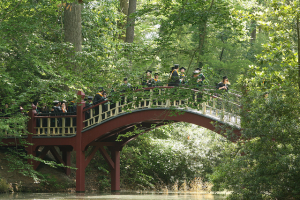What NOT to ask your new graduate
Congratulations, Tribe parents! This weekend, your student will walk across the stage at William and Mary Hall, receive that long-anticipated diploma and step off into the “real” world. Commencement weekend is laden with nostalgia, both on the part of students and parents, and should be a time of great celebration. Nostalgia aside, however, graduation also tends to be accompanied by anxiety for students and parents, especially when the first job or graduate school acceptance are not yet confirmed.
Amidst the revelry, temptation will strike to question your student’s plans and perhaps even critique their choices. But take heed, for there are a few things that should be left unsaid this commencement season.
What are you going to do with THAT degree? Though parents usually know what their students chose to major in during their time at William and Mary, commencement often brings new people into the fold; grandparents, aunts, uncles, and family friends all want to know why your child picked {insert stereotype} {insert major}, when they could have picked {insert better stereotype} {insert their major}. I urge you to help your guests re-frame their thinking on this topic. Your student’s major is only a fraction of what they’ll glean from their W&M education. A major indicates approximately two years of advanced study in an academic area. But, students also study many, many other things. Coursework helps students develop a myriad of marketable skills- critical thinking, problem solving, research, analysis, writing, argumentation, speech, and more- regardless of major. Students also engage in activities, organizations, community service, internships, study abroad, or other outside of class activities. All these things are valuable and contribute to the education of a William and Mary graduate. So resist, and help others to resist, the temptation to label the entire experience with your student’s major choice.
Why don’t you have a job yet? It is actually quite normal for students to graduate without a job offer in hand. Each year, the Career Center collects student outcomes data that indicates many students settle into their first job three to six months after graduation. The apparent delay results from a number of factors. Academic demands can prevent students from fully engaging in the job search process while still working toward their degree. Industry hiring seasons vary widely based on needs and when the fiscal year ends. While finance and accounting firms may hire in November, communications or non-profit jobs may not appear until June, for example. More time may be needed to calibrate the job search process and clarify what the student is looking for. Instead of asking the big WHY, try this: Did you know that the Career Center offers lifelong services to alumni? You can call to set up an appointment this summer to talk about your job search strategy.Or, if you have industry contacts your student might find helpful or interesting, offer to connect them to your professional colleagues for an informational interview, or job shadowing opportunity.
Why don’t you just apply to {insert graduate school of choice}? If your student is uncertain about what they want to do, graduate school may not be the best solution. As higher education costs continue to increase, graduate schools are also placing tremendous debt loads on graduates whose additional degree designation does not guarantee a job. If your student is considering graduate school, remind him or her that the option to complete an advanced degree does not go away. Additionally, if a graduate degree is needed for advancement in a particular field, some employers will provide tuition grants or remission to educate their employees. Encourage your student to evaluate what he or she wants to do first, and then research whether career options require an advanced degree.
Enjoy this weekend and all the pomp and circumstance that comes with it. Celebrate what your student has accomplished at William and Mary. And if a job or graduate school decision is not in hand, support and encourage your student. Trust me, they’ll be grateful for it.




No comments.
Comments are currently closed. Comments are closed on all posts older than one year, and for those in our archive.